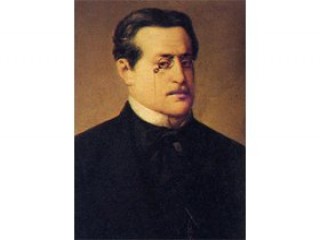
Juan Valera biography
Date of birth : 1824-10-18
Date of death : 1905-04-18
Birthplace : Cabra, Spain
Nationality : Spanish
Category : Famous Figures
Last modified : 2011-08-23
Credited as : Novelist, critic, diplomat
The Spanish novelist, critic, and diplomat Juan Valera y Alcala Galiano (1824-1905) is primarily remembered for his novel "Pepita Jimenez" (1874), which won international fame.
Juan Valera was born in Cabra in the province of Cordova to an aristocratic family. He studied at the Sacro Monte in Granada. He prepared himself for a career in law and diplomacy that would afford leisure time for reading and writing. His father encouraged Juan in his literary pursuits.
Soon after completing his legal studies, Valera was named attache in the Spanish ambassadorial staff of the Duque de Rivas in Naples (1847-1849). While in Italy, Valera studied Italian and other literatures. He then held various other diplomatic posts at Lisbon, Rio de Janeiro, Vienna, and St. Petersburg.
On his return to Spain in 1858 Valera devoted most of his time to writing criticism, poetry, and novels. He was the first critic to recognize the excellence of the poetry of Ruben Dario. Valera became blind in his last years but continued to write, dictating his works to his secretary.
Valera's publications comprise many volumes of literary criticism, poetry anthologies, and novels. Cartas americanas (1889-1890) is a critical work that deals with Spanish American writers. Florilegio de poesias castellanas del siglo XIX (1902-1903) is an anthology of Spanish poetry. His novels include Pepita Jimenez (1874), Las ilusiones del doctor Faustino (1875), El comendador Mendoza (1877), Dona Luz (1879), Juanita la larga (1895), and Morsamor (1899).
Pepita Jimenez, Valera's first novel, is also his masterpiece. It is the story of a young seminarian who falls in love with Pepita, a widow. The setting of the novel reflects the warm, colorful, and emotional qualities of the people of Andalusia. Through Luis de Vargas, the priest-to-be and protagonist, Valera reveals the inner conflict such a person undergoes in the choice between taking Holy Orders forever or loving a woman as a life companion. Luis tries to convince himself at the beginning of the novel that Pepita is merely "a beautiful creature of God" whom he loves but only as if she were "his own sister." The analysis of his emotional state is both tender and psychological, at times disturbing, but the ordeal ends happily with Luis's decision to marry the charming Pepita.
















